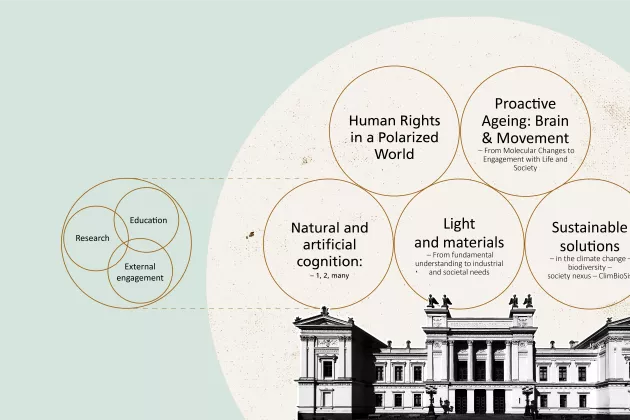The selected profile areas are:
- Human Rights in a Polarised World
- Light and Materials – from fundamental understanding to industrial and societal needs
- Natural and Artificial Cognition: 1, 2, many.
- Proactive Ageing: Brain & Movement – from molecular changes to engagement with life and society
- Sustainable Solutions in the Climate Change – Biodiversity – Social nexus – ClimBioSis
There has been a long process leading up to the decision and we have learned many important lessons. I discuss these in more detail in a post on the blog “Identifying Profile Areas at Lund University”. I thought that here I would take up some more personal reflections.
During the process, I have on repeated occasions felt incredibly proud to be working at Lund University. When I read the original 24 notifications of interest, I felt very proud to be working at a university where so much exciting and good research is conducted and where there are so many bold plans. When the panel interviewed representatives for 11 of the proposed profile areas, I felt proud of the often very intelligent, insightful and reflective answers to the challenging questions.
I have also felt proud of working at a university where the deans and deputy deans in both the Vice-Chancellor’s Management Council and on the panel, could separate themselves from their faculty’s specific interests and think about what was best for the University as a whole. The external representatives on the panel also expressed their appreciation about this.
All the researchers who drew up notifications of interest have devoted a lot of work to the proposals. For those of us involved in the assessments, it has been a demanding assignment that we have carried out with a great deal of thoughtful consideration. I hope that the others involved in the process have found it as enriching as I have. When I read the notifications of interest and the supplementary answers to questions on research, external engagement and teaching, I enjoyed finding out about, and forming an opinion on, innovative plans in widely differing areas. It was both interesting and very meaningful over two panel days to listen to presentations of research and discussions about conditions for research in the proposed areas.
So far, we have named five profile areas at Lund University. Now, the work begins on further developing these, making them visible and creating a governance model for the profile areas. In parallel with this, we will jointly write an application for the national call regarding profile areas, which is expected in spring 2023.
The process of developing profile areas has resulted in many good ideas, contacts and collaborations. I hope that many of these can continue to be developed with the faculties’ support or with external funding. Together, we will also discuss the lessons to be learned from the process, with an aim to initiate a new process to identify the next group of profile areas at Lund University in 2023.
/Per Mickwitz
Read more:
- More information about Lund University’s five profile areas – Identifying Profile Areas at Lund University
- To the post on the blog “Identifying Profile Areas at Lund University”
- Quality-based resource allocation – further developed proposal for a new model"



